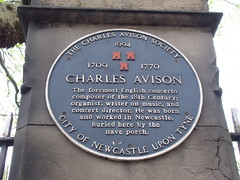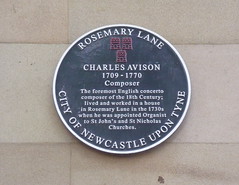Charles Avison
Commemorated on 4 plaques
Assembly House, Westgate Street. Charles Avison 1709-1780. Composer. Held his first public subscription concert in this building in 1735. the first Assembly Rooms in Newcastle 1716-1736.
Westgate Street, Newcastle upon Tyne, United Kingdom where they played (1734)
1709-1770 Charles Avison. The foremost English concerto composer of the 18th Century; organist, writer on music, and concert director. He was born and worked in Newcastle. Buried here by the nave porch.
St Andrew's Church, Newgate Street, Newcastle upon Tyne, United Kingdom where they was buried (1770)
Charles Avison 1709-1770 Composer. The foremost English concerto composer of the 18th Century; lived and worked in a house in Rosemary Lane in the 1730s when he was appointed Organist to St John's and St Nicholas Churches. Rosemary Lane, City of Newcastle upon Tyne.
Rosemary Lane, Newcastle upon Tyne, United Kingdom where they lived and worked
Charles Avison (1709 - 1770) The most important English concerto composer of the 18th century was buried alongside his wife, son and grandson:"...for he was as much loved for the goodness of his private character as for his excellent compositions". Avison's once widely popular, unusually tuneful string concertos, mentioned in John Wesley's 'Journal' and Laurence Sterne's 'Tristram Shandy', were submerged under the torrent of modern symphonies after his death. Robert Browning's poem 'Parleying with Certain People of Importance in Their Day' (1887) portrayed Avison as a once famous person then forgotten - a victim of changing musical tastes: "Hear Avison! He tenders evidence That music in his day as much absorbed Heart and soul then as Wagner's music now." In 1890 a new gravestone was placed over the old that included lines from Browning's 'Parleying'.
St Andrews Churchyard, Newgate Street, Newcastle upon Tyne, United Kingdom where they was buried (1770)





